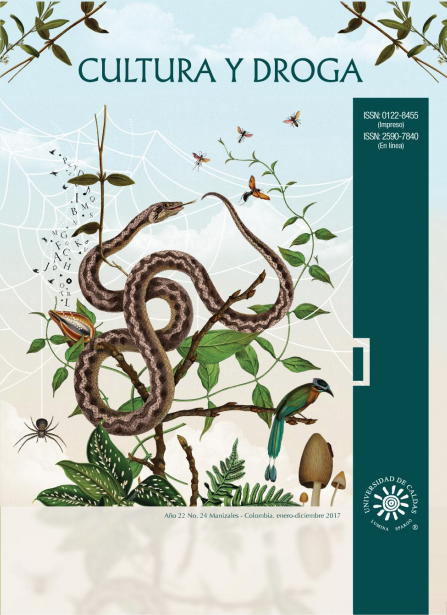Authors
Abstract
Objective. To carry out a critical review of Zigon’s concepts of assembly and situation with the aim of showing its analytical possibilities to describe social actors and socio-technical networks (or points d'appui according to Foucault) that serve as symbolic and material support for the global phenomenon known as ‘prohibition’ or “war on drugs”. Methodology. Ethnography of anti-prohibitionist activism, including techniques of participant observation, interviews and archive. Results and conclusions. It is considered that this perspective can improve the understanding of the theoretical and political challenges of studying and participating in the anti-prohibitionist movement in Colombia. The text is divided into three sections: The first part arises from an ethnographic case to understand the challenges of thinking “drug policies” from alternative perspectives to the so-called ‘prohibitionism’, thus introducing the framework in which the concepts which will be studied later make sense. In the second part, both concepts are discussed together with some contemporary theorists who have critically used the discussions of the so-called “ontological turn” in anthropology. To conclude, in the third part, there is a reflection on the role of drug users in the production of academic knowledge and in the construction of new political arrangements to regulate the relationships between people and drugs.
References
Connolly, W. (2013). The Fragility of Things: Self-organizing processes, neoliberal fantasies, and democratic activism. Durham, London, England: Duke University Press.
Derrida, J. (2003). The Rhetoric of Drugs. En A. Alexader and M. Roberts (Ed.), High Culture: Reflections on Addiction and Modernity (pp. 19-44). New York, USA: State University of New York Press.
Escohotado, A. (2014). La última cruzada de la prohibición. Conferencia magistral. Universidad de Antioquia, Medellín, Colombia.
Fergusson, S. y Góngora, A. (2012). La relación entre personas y drogas y los dispositivos de inclusión social basados en la comunidad. Recuperado de http://www.mamacoca.org/docs_de_base/Debate_despenalizacion_Colombia/fergusson_y_Gongora_relacin_personas_drogas_dispositivos_incluson_social_2013.pdf.
Foucault, M. (1976). Vigilar y Castigar. Buenos Aires, Argentina: Siglo XXI editores. Gomart, E. (2002). Six Effects in Search of a Substance. Social Studies of Science, 32 (1), 93-135.
Machín, J. (2010). Modelo ECO2: redes sociales, complejidad y sufrimiento social. REDES. Revista Hispana para el Análisis de Redes Sociales, 18 (12), 305-325.
Milanese, E. (2012). Tratamento comunitário: manual de trabalho I. São Paulo, Brasil: Instituto Empodera.
Pedraza, Z. (2004). El régimen biopolítico en América Latina. Cuerpo y pensamiento social. Iberoamericana, IV (15), 7-29.
Stengers, I. and Ralet, O. (1997). Power and Inventions: Situating Science. Minneapolis, USA: University of Minnesota Press.
Szasz, T. (1992). Our Right to Drugs. The Case for a Free Market. New York, USA: Praeger.
Vargas, E. (2006). Uso de drogas: a alter-ação como evento. Revista de Antropologia, 49 (2), 582-623.
Zigon, J. (2015). What is a Situation?: An Assemblic Ethnography of the Drug War. Cultural Anthropology, 30 (3), 501-524.

 PDF (Español)
PDF (Español)
 FLIP
FLIP





















